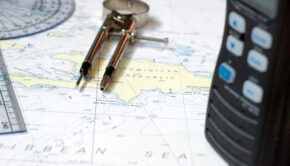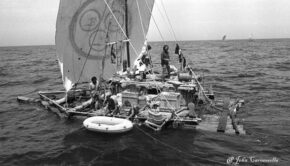GPS Interference and AIS Spoofing
Published on March 15th, 2022
The use of a sextant for navigation is difficult and less accurate than modern options, but at least it’s not hackable. According to this US Maritime Advisory, that’s a bonus:
Instances of significant GPS interference have been reported worldwide in the maritime domain. This interference can result in lost or inaccurate GPS signals affecting bridge navigation, GPS-based timing, and communications equipment (include satellite communications equipment).
Over the last six months, areas from which multiple instances have been reported include the eastern and central Mediterranean Sea, specifically in the vicinity of the Suez Canal, Cyprus, Malta, and Istanbul, in the Persian Gulf near Dammam, KSA, and off the coast of Brazil.
The U.S. Coast Guard Navigation Center (NAVCEN) provides a chronological list of recently reported GPS problems. Additionally, Automatic Identification Systems (AIS) are open, unencrypted, and unprotected radio systems intended to operate on non-secure VHF-FM channels. As such, AIS signals can be spoofed, resulting in incorrect or missing AIS data.
Exercise caution when underway and prior to getting underway. NAVCEN and NATO Shipping Center provide information regarding effective navigation practices for vessels experiencing GPS interference.
The information reaffirms safe navigation practices when experiencing GPS interference, provides useful details on reporting disruptions, and is intended to generate further discussion within the maritime community about other disruption mitigation practices and procedures.
This guidance also recommends reporting such incidents in real time; noting critical information such as the location (latitude/longitude), date, time, and duration of the outage/disruption; and providing photographs or screen shots of equipment failures experienced to facilitate analysis.
AIS devices do not inherently have virus or malware protection, so cyber security best practices against hacking should be adhered to if you connect your AIS to a network or update it using removable electronic devices (e.g. USB drives).
AIS, while an invaluable situational tool, should never be solely relied upon for collision avoidance or navigational decision-making.









 We’ll keep your information safe.
We’ll keep your information safe.